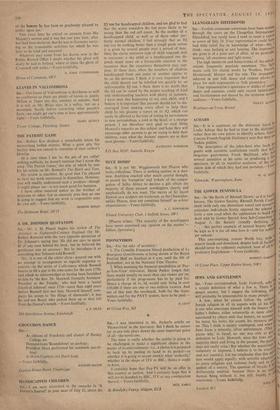am most interested in the remarks in 'A Doctor's Journal'
in your issue of July 31, about the
IQ test for handicapped children, and am glad to find that the writer considers the test more likely to be wrong than the red cell count. As the mother of a handicapped child, as well as of three other per- fectly normal children, I feel strongly that an IQ test can be nothing better than a rough guide unless it is given by several people over a period of time. Only the clever extrovert type of child responds well to everyone; a shy child or a handicapped one de- pends much more on a favourable reaction to the examiner than the examiners. themselves may sup- pose. In these days, when the numbers of children handicapped from one cause or another appear to be on the increase, I think it is very important that the child should not be labelled too quickly by an unfavourable IQ test. I think there is no doubt that the IQ can be raised by the proper teaching of kind and understanding teachers with plenty of patience. I have seen this happening to my own child, and I believe it is important that parents should not be dis- couraged from making every effort to help their child by too gloomy a report on its IQ, which can easily be affected at the time of testing by nervousness in new surroundings, a cold in the head, or a strange person. I am therefore very glad to • read Miles Howard's remarks on this subject and hope they will encourage other parents to go on trying to help their children, even when the doctors' reports arc at their most gloomy.—YoUrs faithfully,
KATHLEEN WINDHAM


































 Previous page
Previous page